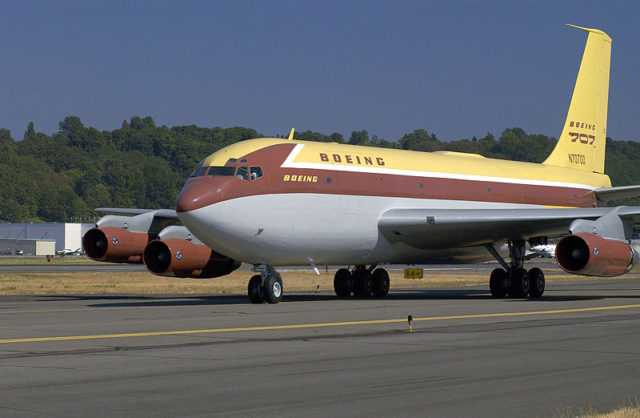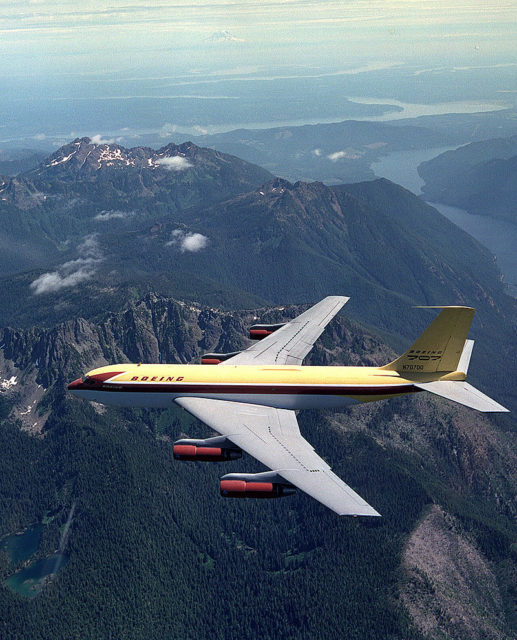Alvin M. “Tex” Johnston (August 18, 1914 – October 29, 1998) was an American jet-age test pilot for Bell Aircraft and the Boeing Company.
Early years
On August 18, 1914, Alvin “Tex” Johnston was born to his parents Alva and Ella Johnston, who were farmers in Admire, Kansas. At 11 years old in 1925, Tex made his first flight when a barnstormer landed near his home. On that day, he made the decision to become a pilot. At the age of 15, he made his first solo flight after receiving mechanics and piloting instruction. Once he graduated from high school, Tex began barnstorming himself. He later returned to school to study engineering, but dropped out in 1939 before he actually finished the courses required to obtain his degree.
In 1935, he married his wife, Delores. He became an instructor at the Civilian Pilot Training Program. When the United States entered WWII, Tex transferred to the U.S. Army Air Corps Ferry Command.

Test pilot
December of 1942, Tex went to Bell Aircraft as a flight test engineer, flying the P-39 Airacobra and the XP-63 during their prototype phases. He also flew the XP-59 and the first US jet. He earned his nickname, “Tex” because he always wore his Stetson cowboy hat and cowboy boots while on the flight line.
Once WWII had ended, Tex bought and modified two surplus Airacobras to enter and win the Thompson Trophy at the 1946 National Air Races.
On May 22, 1947, after having helped design the rocket-propelled Bell X-1, Tex got to fly it. He stayed on at the program as a design advisor for the modifications and trim controls because he had discovered that they were not usable in the configuration they were manufactured at high subsonic speeds. On the Discovery Channel in 1991, he told of his experiences in the rocket plane for the documentary series “Frontiers of Flight” stating “…the airplane was just gorgeous” and that its 18 G design was “indestructible”.
In July 1948, he became a test pilot for Boeing, flying the B-47 Stratojet and then piloting the first flight of the Boeing B-52 Stratofortress prototype.
Tex is most known for doing a barnstormer style barrel roll-over maneuver in Boeing’s revolutionary 367-80 jet in a demo flight over Lake Washington outside of Seattle on August 7, 1955. The maneuver was caught on film and has been frequently seen on Discovery Wings cable channel in a three-minute short as a part of the Touched by History series when the channel was still on the air.
Tex was called before the then-president of Boeing, Bill Allen, for rolling the plane. He was asked what he thought he was doing, and responded, “I was selling airplanes”. He kept his position as a test pilot and did not get into any legal trouble for his actions. His flying style and cowboy type dress is said to be the inspiration for Dr. Strangelove character Maj. T. J. “King” Kong, who, in rodeo style, rode a balky nuclear weapon to its target.

Tex was the assistant program manager for Boeing’s X-20 Dyna-Soar program in Seattle, Washington from 1960 to 1963.
He then became Boeing’s Atlantic Test Center Manager in Cocoa Beach, Florida from 1964 to 1968, working on two programs, the Minuteman missile and the Lunar Orbiter designed for the Apollo missions. He also worked with Nasa helping to manage Saturn and Apollo missions.
Tex left Boeing in 1968 to manage Tex Johnston, Inc., Total-In-Flight-Simulator Inc. and Aero Spacelines, that handled the making and certification of the oversized cargo plane known as the Pregnant Guppy. He became the director and chief pilot of Stanley Aviation Corporation in 1975, focusing on personnel escape systems (ejection seats). In 1993, he was inducted into the National Aviation Hall of Fame.
